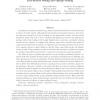Free Online Productivity Tools
i2Speak
i2Symbol
i2OCR
iTex2Img
iWeb2Print
iWeb2Shot
i2Type
iPdf2Split
iPdf2Merge
i2Bopomofo
i2Arabic
i2Style
i2Image
i2PDF
iLatex2Rtf
Sci2ools
115
click to vote
MANSCI
2010
2010
Revenue Management with Strategic Customers: Last-Minute Selling and Opaque Selling
Companies in a variety of industries (e.g., airlines, hotels, theaters) often use last-minute sales to dispose of unsold capacity. Although this may generate incremental revenues in a short term, the long-term consequences of such a strategy are not immediately obvious: more discounted last-minute tickets may lead to more consumers anticipating the discount and delaying the purchase rather than buying at the regular (higher) prices, and hence potentially reducing revenues for the company. To mitigate such behavior, many service providers have turned to opaque intermediaries such as hotwire.com that hide many descriptive attributes of the service (e.g., departure times for airline tickets) so that the buyer cannot fully predict the ultimate service provider. Using a stylized economic model, this paper attempts to explain and compare the benefits of last-minute sales directly to consumers vs. through an opaque intermediary. We utilize the notion of rational expectations to model consum...
| Added | 29 Jan 2011 |
| Updated | 29 Jan 2011 |
| Type | Journal |
| Year | 2010 |
| Where | MANSCI |
| Authors | Kinshuk Jerath, Serguei Netessine, Senthil K. Veeraraghavan |
Comments (0)

